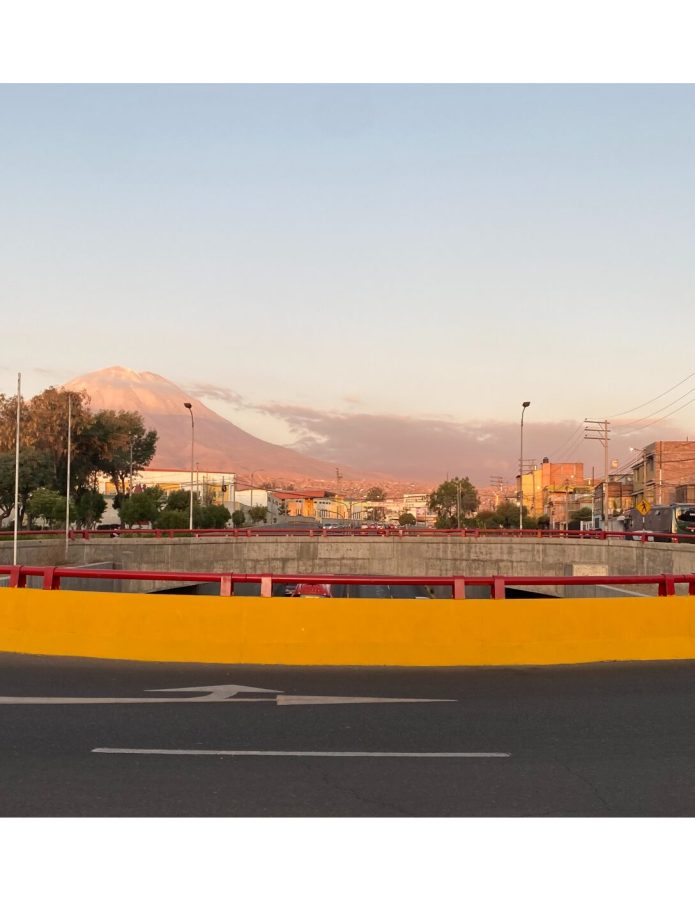Calvin students in Peru faced uncertainty, delays during protests
Arequipa, Peru saw significant protests –– even on the street where Kornoelje’s host family lived, pictured here in a quiet moment
Last fall, 12 Calvin students and one faculty member spent a semester studying in Arequipa, Peru –– which was an amazing experience, according to senior Sadie Kornoelje.
But in the face of political turmoil and increasingly forceful demonstrations, the local airport shut down and canceled the Calvin group’s flight home, resulting in a period of uncertainty and anxiety. In the end, everyone made it home safely –– albeit days later than planned.
Peru was hit with a period of political turmoil when Peruvian President Pedro Castillo –– faced with his own impeachment proceedings –– attempted to dissolve Congress on Dec. 7. He failed and was ultimately impeached. As a result, former Vice President Dina Boluarte was sworn in as Peru’s first female president.
Unrest quickly erupted throughout the country.
“There’s always protests in Peru –– [but] not like these kinds of protests,” said junior Lindsey Stinton, another Calvin student on the trip. The demonstrators belonged to several different sides, she told Chimes. “Some people were for Castillo. Some people were against him.” Kornoelje added that some Peruvians took issue with Boluarte as a female president.
“There were protests down my street a couple of times,” said Kornoelje, who lived with a host family in Arequipa. She didn’t witness any violence, but the experience was still “a little unsettling.”
“When the protests first began, they were peaceful,” Scott Lamanna, the Calvin professor who accompanied the students studying in Peru, told Chimes in an email.
But on Dec. 12, damage caused by the unrest forced the airport in Arequipa to shut down.
The Calvin group had been scheduled to fly out of Arequipa on Dec. 17. With several days of buffer, most Calvin students expected that they would depart as planned and spend the weekend in Lima, Peru’s capital. Then, they would leave Lima on Dec. 20 and make it back to the United States well before Christmas.
“At first, when the airport closed, they were like, ‘Oh yeah, we’ll have it back open tomorrow. It’ll be fine,’” Kornoelje said. “And then, it was the next day, and they were like, ‘We’ll have it open tomorrow. It’ll be fine.’ And they kept saying that.”
But on Dec. 16 –– just one day before their scheduled departure –– the Calvin group learned that their flight out of Arequipa had been canceled, Kornoelje told Chimes.
The next few days were marked by “uncertainty,” according to Stinton.
“We were told at that point that we should be ready to leave at any moment, if we can get on a flight,” Kornoelje said. “You didn’t feel like you could enjoy those last couple days. I didn’t feel like I could go visit friends, because I was like, ‘What if I have to leave in an hour?’”
“Not knowing when I would be going home was really frustrating,” Stinton said. “My family was really excited for me to come home. I want[ed] to be home for Christmas.”
Lamanna –– who served as the “main liaison” between the Calvin students studying abroad, the students’ parents, the university and the Peruvian government –– expressed thankfulness for God’s sustenance during those “intense and exhausting” days. Student safety, he said, was his “top priority.”
Lamanna told Chimes he communicated with his students via a WhatsApp group chat, while the students’ parents received frequent email updates.
When it came to communication, Calvin students had mixed feelings. Kornoelje felt that their parents were prioritized over the students themselves. “We felt like we had to press for information,” she said.
Stinton was satisfied with the communication she received. “The uncertainty wasn’t nice, but as soon as they had answers, they were sharing them with us,” she said.
On Dec. 18, Kornoelje told Chimes, the students were finally able to book a flight out of Arequipa for Dec. 22.
Having a concrete departure date was helpful, according to Kornoelje. “Once we had that plan –– yeah, I still really wanted to go home, but I felt like I was more okay with the fact that we were still there.”
Both Kornoelje and Stinton mentioned that, in theory, some Calvin students could have flown out of Arequipa earlier: the airport reopened on Dec. 19, a few days before their eventual departure. But because they would have been forced to do so in smaller groups, rather than as a whole, this was not allowed.
Lamanna said that he had made the decision with support from Calvin administrators.
“It would have been harder to ensure student safety if they were traveling in smaller groups or individually,” he told Chimes via email. “Keeping students safe was still my (and Calvin’s) responsibility as long as they were in the host country.”
On Dec. 22, the Calvin group flew from Arequipa to Lima. From there, they flew to Miami and then splintered off in various directions. For some, travel problems didn’t end there. Both Kornoelje and Stinton were flying east –– directly into a blizzard.But finally, on Christmas Eve, Stinton and Kornoelje reached their respective homes.
“Oh, I wept,” said Stinton, describing the joy of seeing her dogs.
“It was so surreal,” Kornoelje said. “We kept joking that we should make this a Hallmark movie –– [like], ‘will we get home for Christmas?’ And when we did, it was like the happy ending.”
Despite a somewhat rocky conclusion to their time in Peru, both students spoke positively about the experience as a whole.
“I don’t want people to see Peru in this terrible light now,” Stinton said. “It was really beautiful. I encourage everyone to go.”
“I don’t think this should stop Calvin from doing this program again,” Kornoelje told Chimes. “This could’ve happened anywhere. [Similar protests have] happened here before.”
“Peru is an amazing, beautiful country, our host institution and host families took good care of us, and students made great gains in their ability to speak Spanish to engage crossculturally,” Lamanna said. “I hope these are the main things that people remember about the semester.”








